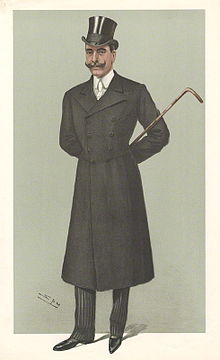|
Prince Francis of Teck
Prince Francis of Teck (Francis Joseph Leopold Frederick; 9 January 1870 – 22 October 1910) was the younger brother of the British queen Mary of Teck, wife of King George V. Family
Francis Joseph Leopold Frederick, known as "Frank", was born at Kensington Palace and educated at Wellington College, Cheltenham College (Stone, 1912, p. xviii)[1] and the Royal Military College, Sandhurst. His father was Prince Francis, Duke of Teck, the son of Duke Alexander of Württemberg and Countess Claudine Rhédey von Kis-Rhéde (created the Countess von Hohenstein). His mother was the Duchess of Teck (née Princess Mary Adelaide of Cambridge), the youngest daughter of Prince Adolphus, Duke of Cambridge and a granddaughter of George III. Frank was thus styled "His Serene Highness Prince Francis of Teck". EducationHe was expelled from Wellington College, Berkshire "for throwing his housemaster over a hedge to win a bet. All through his life he was an incorrigible gambler. He then went to Cheltenham where he got into more trouble."[2] Personal lifeFrancis never married. According to Julia P. Gelardi's Born to Rule, Prince Francis was vigorously pursued by Princess Maud of Wales, his sister's sister-in-law. The two exchanged letters, but it soon became clear that Francis was not interested in Maud. She went on to marry her first cousin Prince Carl of Denmark, becoming Queen of Norway in 1905. Francis had an affair with society beauty Ellen Constance, wife of Francis Needham, 3rd Earl of Kilmorey,[3] to whom he allegedly bequeathed the Cambridge emeralds, part of the Teck family jewels. To recover these family heirlooms, Francis's sister, Queen Mary, negotiated with Lady Kilmorey to buy back the emeralds, reportedly paying her £10,000 for them.[4] His will was also sealed to avoid potential scandal.[5] The document remains unpublished, and subsequent royal wills have followed this tradition.[6] His estate was valued at £23,154 (or £1.9 million in 2022 when adjusted for inflation).[7][8][9] The English actress Sarah Miles has claimed to be the great-granddaughter of Prince Francis, through her grandfather, allegedly an illegitimate son of the Prince called Francis Remnant, born in Richmond, Surrey, in 1894.[10] Military careerHe attended the Royal Military College, Sandhurst and served in the Lancers and the Royal Rifle Corps before joining the Royal Dragoons in 1890. He rose to the rank of Major, before retiring in 1902.
In 1902 he again visited South Africa, and following the end of hostilities returned to England in June that year on board the SS Kinfauns Castle.[13] DeathHe died suddenly in 1910 at the age of forty, having caught pneumonia at Balmoral.[14] After being initially interred in the Royal Vault at St George's Chapel, Windsor Castle, he was buried in the Royal Burial Ground, Frogmore.[15] Orders and decorations
Ancestry
References
External links |
||||||||||||||||||||||||||||||||||||||||||||||||||||||||||||||||||||||||||||||||||||||||||||||||||||||||||||||||||||||||||||||||||||||||||||||||||||||||||||||||||||||||||||||||||||||||||||||||||||||||||||||||||||||||||||||||||||||||||||||||||||||||||||||||||||||||||||||||||||||||||||||||||||||||||||||||||||||
